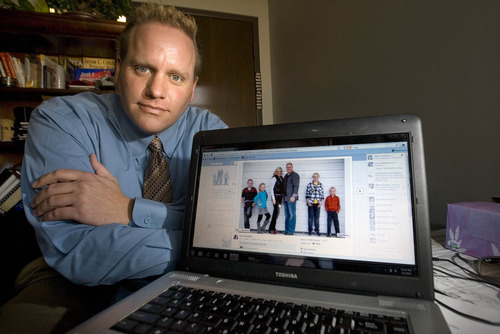This is an archived article that was published on sltrib.com in 2012, and information in the article may be outdated. It is provided only for personal research purposes and may not be reprinted.
Troy Read Critchfield is not a kidnapper. He is not a rapist.
But often he is treated like one.
Nearly everyone with Internet access has run a Google search on their own names, but few find an infamous criminal.
Critchfield, though, cringes every time he pulls up his name. Instead of his real estate website, realdealutah.com, or even his Facebook page, news articles about Troy Reed Critchfield fill his screen.
Sandy police in December arrested that Critchfield for allegedly kidnapping a woman and raping and sodomizing her for days before she was able to access Facebook and beg for help. That Critchfield also had a 2010 conviction for felony aggravated assault but had been released on probation.
Troy Read Critchfield, a father of four residing in Riverton and a real estate agent at RCI Realty, has known of the other man's existence for 21 years. When he was 16, he went into his bank to ask for his account number. The teller was confused because another man with a nearly identical name held an account at the bank as well.
While that issue took just a few minutes to clear up, the problems have escalated since.
This most recent story, which hit news wires across the country, was the worst. He has received messages and wall posts on Facebook, lambasting him for being a cretin.
The scariest moment came when his real estate firm received a phone call from the Utah Division of Real Estate saying they likely would have to pull Critchfield's license because of the crimes he was charged with. His brother, Jayson, broker for the group, used birth dates — though they both share October, they are four years apart — and the single-letter difference in their middle names to verify his story.
"As a real estate agent, honesty and integrity are so important. You have to be trustworthy," Critchfield said. "This whole thing has been pretty upsetting."
In addition to smearing his name, and his social media sites, which he uses heavily for marketing and sales, the situation has destroyed his credit.
In 2005, he went to a car dealership to buy a Yukon XL and was quoted an incredibly high interest rate. He couldn't figure out why because his credit score was "impeccable." They printed out the report, and Troy Reed Critchfield's Social Security number and credit history had somehow become attached to his credit score.
"We sorted it out, and I was able to get a decent car loan rate, but this has been a nightmare," he said, but the other Critchfield's Social Security number is still linked to his credit report.
His wife and mother have fielded angry phone calls from attorneys and collections agencies, and concerned ones from far-flung relatives. He even has an LDS missionary couple in Greece praying for him because of a news article about the kidnapping they read online.
News agencies have long been careful to make sure they properly identify people charged with crimes, both because of ethical guidelines and because they don't want to get on the wrong side of libel laws.
It's why many infamous murderers have three well-known names. Lee Harvey Oswald, John Wayne Gacy, Gary Arthur Bishop. The practice even goes as far back as John Wilkes Booth.
It's one of the reasons why Ron Gardner, a retired vice president for a large insurance broker, has only ever jokingly associated his name with the recently executed murderer Ronnie Lee Gardner.
"Only once over all the years has someone else brought it up, and that was in jest," the Bountiful resident said.
Using middle names is the best journalists can do to ensure clarity in their reporting. But now with the accessibility and lack of filtering on the Internet, sometimes news consumers don't double check whether they're condemning the right person before they hit the enter button on Facebook or Twitter.
"You have safeguards in a newsroom that don't apply to social media," said associate professor James Fisher at the University of Utah's communication department and former ethics chairman of Utah's chapter of the Society of Professional Journalists. "Good reporters don't take a single source, they get corroboration. But you can really rile people up with a tasty Tweet."
He says news consumers, too, must be cautious and avoid making assumptions.
"A carefully educated public and readership is part of the solution," Fisher said.
Ellyn Angelotti, faculty for the Poynter Institute's Digital Trends and Social Media, agrees.
"Vetting and verification is the most important part in practicing and consuming journalism," she said.
She cautions social media users not to assume the first name they click on is the person about whom they may have read a story.
"Critical thinking is a missing piece when you have so much information out there. People are accepting what they see on social networks as the final answer or final opinion," Angelotti said. "Make sure you're getting at the truth and pulling in multiple perspectives."
Critchfield says some of his clients have questioned whether he was the one who is charged with so many felonies. His mother had to announce to her fellow churchgoers that her son was in fact not behind bars. But Critchfield has to keep his Facebook profile open to connect with future clients, and while he's paid for monthly credit monitoring, things just seem to get more difficult.
"People peek at other people online to see what's going on and find out what kind of person you are," he said. "I don't know what the lasting impacts will be, but it's frightening."
Twitter: @sheena5427



